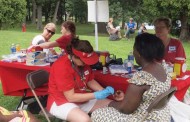Stressed out? Don’t ignore it.
By Dr. Erin Piontek
 Stress is a normal part of life, but it can be a serious issue for our health. Figuring out how to best manage it may be a challenge — but it’s one worth tackling.
Stress is a normal part of life, but it can be a serious issue for our health. Figuring out how to best manage it may be a challenge — but it’s one worth tackling.
While the response to stress is supposed to be protective, chronic exposure to stress can increase the risk for high blood pressure. The good news is that there are strategies to reduce stress and your risk for health complications.
While at work, take time to do something enjoyable, like going for a walk or reading during a break. Confront stressful situations head on and do not let them fester. Learning time management skills can also help us make sense of the day and what we have ahead of us.
Outside of work, there are many paths to better health and less stress.
The obvious routes include stopping smoking and limiting alcohol consumption. Focusing on building a strong support system is also helpful, as this reduces stress levels and helps you take better care of yourself. Anxiety and depression are independent risk factors for the development of heart disease, so please seek help if you need it.
Exercise is critical to our overall health, and it can reduce the amount our heart rate goes up during stressful situations. Exercising 30 minutes a day four to five days per week is a great start.
Getting enough sleep also goes a long way, and the benefits are clear. Sleep affects mood, mental alertness, energy, and physical health.
Eating better is always good advice. It makes us feel better, and there are diet plans focused on reducing blood pressure and increasing heart health. The DASH (Dietary Approaches to Stop Hypertension) and Mediterranean diets are good examples. They differ slightly, but they focus on eating more vegetables, fruits, whole grains, healthy fats, and lean proteins. They also don’t require special foods and are easy to follow.
 While stress cannot explain away all cardiovascular problems, it is something that we shouldn’t ignore. Visiting your doctor regularly, being aware of the impacts of stress, and intervening early are keys to reducing your risk for future health complications.
While stress cannot explain away all cardiovascular problems, it is something that we shouldn’t ignore. Visiting your doctor regularly, being aware of the impacts of stress, and intervening early are keys to reducing your risk for future health complications.
Dr. Erin Piontek
Dr. Piontek practices family medicine at Mercy Yarmouth Primary Care located at 385 Route One in Yarmouth.
Content Provided by Mercy Hospital





